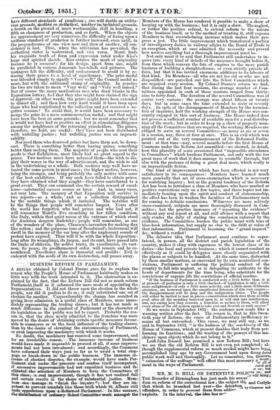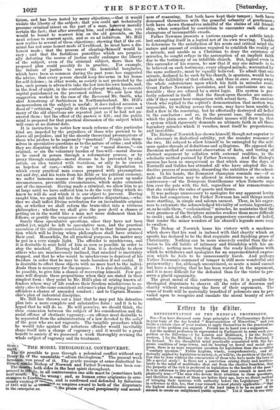Mit. M. D. HILL ON DETENTITE POLIC 7 " wi r i 4 rin and Taz Recorder
of Birmingham has just made his annua'l g; dum on reform of the correctional law ; the subject this and carbide that which he broached last year—the detention bffenders, in 'order to prevent them from Rain'. bY ChaPman saa Juiploits. In the interval/ the idea basso" ticism, and has been tested by many objections,—that it would violate the liberty of the subject; that you could net technically presume criminal intent on the part of a man, hoeve.. ver .morally certain the fact; that after arresting him, and releasing , you would be bound to rearrest him on the old grounds, ou the next release to rearrest again, and so on ad infinitum. Mr. Hill now replies to several of these objections; showing that if the cri- minal has not some honest mode of livelihood, he must have a dis- honest mode ; that the process of dearing4lhiumelf would be easy ; and that the fastidious punctilios which are perpetu- ally defeating the course of justice really endanger the liberty of the subject, even of the criminal subject, more than the proposed plan could possibly do in practice. For example, the failure of justice to arrest the homicidal burglaries, which have been so common during the past year, has suggested the advice, that every person should keep fire-arms in his house for self-defence; in other words, as society is not protected by the law, each person is advised to take the law into his own hands, and, in le dead of night, in the confusion of abrupt waking, to execute capital punishment on the presumed robber. We saw how that suggestion worked in the ease of the Reverend Mr. Smith, who shot Armstrong of Sorbietrees in Northumberland. Mr. Hill's memorandum on the subject is useful.: it does indeed occasion a flood of " criticism," especially at this quiet season of the year; and many of the old objections are repeated just as if he had not an- swered them : but the effect of the answer is felt ; and the public mind is prepared for that practical discussion of the subject which will come at no distant date.
It is instructive to notice how much reforms of this particular kind are impeded by the prejudices of those who pretend to be above all prejudice, and by the sheerly theoretical presumptions of those who profess to be supremely "practical." People lose them- selves in speculative questions as to the nature of crime ; and while they are disputing whether it is " sin " or "moral disease,"—sin original, or sin the voluntary burden of free-will—moral disease to be cured in person through a reformatory process, or by proxy through example—moral disease to be prevented by edu- cation, an idea tainted with Socialism, or only to be coerced as hopeless of cure,—while we are lost in disputation to which every practical man comes prepared with presumptions cut and dry, and his texts from his Bible or his political economy, we suffer immense masses of the population to grow up under circumstances, preventible circumstances, which make criminals out of the innocent. Having made a criminal, we allow him to go at large until we have suffered him to do the very thing which we know he will do and which it is our object to prevent. Having caught him, we again fall into the speculative disputations,—whe- ther we shall inflict Divine retribution for an ineradicable original sin, or whether we shall reform the bride-idiot into a virtuous philosopher ; whether we shall give the poor devil a chance of getting on in the world like a man not more dishonest than his fellows, or gratify the vengeance of society. Surely these speculative questions, since they have not been settled yet, might be left to speculative men, and the practical execution of the ultimate conclusion be left to that future genera- tion which will be living when philosophers shall have attained their goal. Meanwhile, for all practical purposes, the matter may be put in a very simple light. The offender is mischievous, and it is desirable to seize hold of him as soon as possible in order to atop the mischief. Having hold of him, it is desirable to show others who are mischievously inclined, that mischief is inevitably stopped, and that he who would be mischievous is deprived of his freedom in order that he may be made harmless if not useful. It is desirable to effect those objects with no more hurt to the indivi- duals than is necessary for the purpose. It is also desirable, if it be possible, to give him a chance of recovering himself. Few per- sons will dispute these propositions when they are stated in their simplest form : they point to Mr. Hill's plan of seizing known of- fenders whose way of life renders their freedom mischievous to so- ciety- also to the same consistent reformer's plan for giving juvenile offenders a chance of amended conduct ; and to Captain Macono- chic's plan of industrial discipline. Mr. Hill has thrown out a hint that he may put his detentive plan into a more complete and substantive form : and it is to be hoped that he will do so. He will perceive, we should think, the close connexion between the subject of his consideration and the social offence of obstinate vagrancy,—an offence most desirable to be separated from the administration of a law devoted to the relief of the poor who are not vagrants. The tangible procedure which he would take against the notorious offender would inevitably shape itself into a charge of vagrancy ; and it would be a great benefit to society if we possessed a work thoroughly revising the whole subject of vagrancy and its treatment.



























 Previous page
Previous page